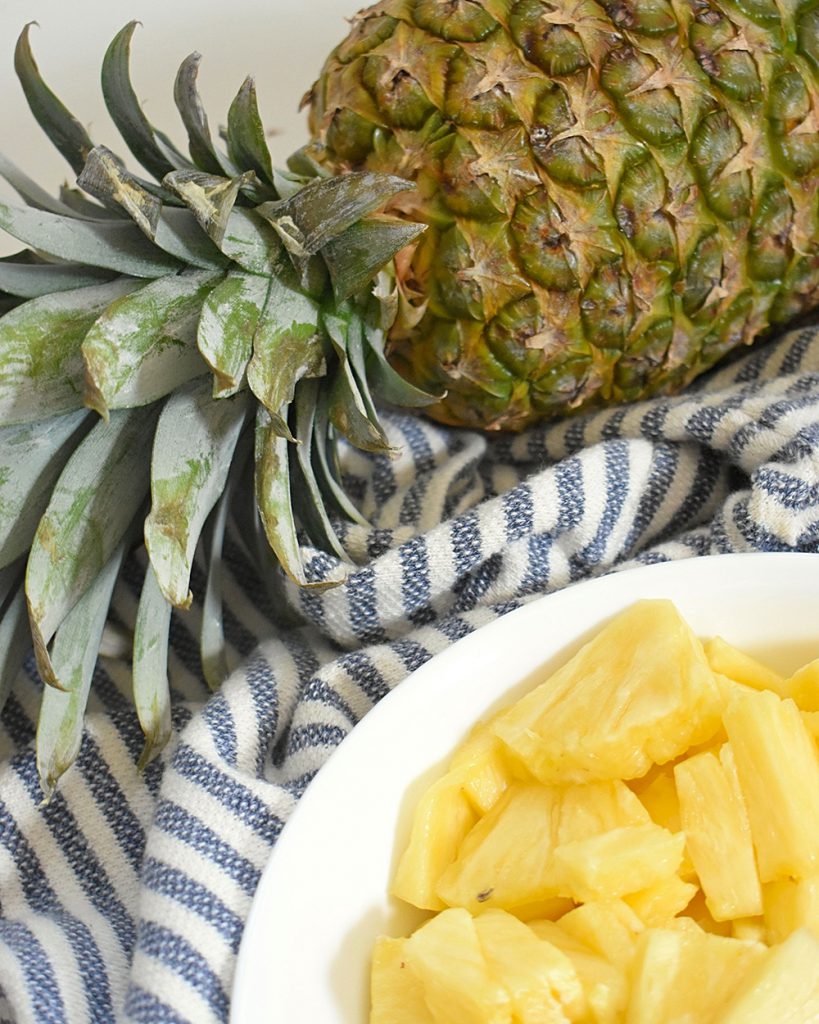
Falling Into One of the 5 Main Food Groups, Pineapple Is a Valuable Addition to Our Diets
From vitamin C to bromelain, pineapple is packed full of valuable nutrients and minerals that play an important role in keeping us healthy. In honor of National Pineapple Month this October, we sat down with registered dietician and nutritionist Amanda Perrin of Peace of Nutrition to dig into the details and learn more about the health benefits our favorite fruit has to offer.
Tell us a little bit about yourself and your experience in nutrition. What does your practice focus on?
I offer a friendly, casual counseling atmosphere with an attentive approach to address the needs and nutrition-related goals of my clients. I am proud to be trained to help my clients navigate through the maze of nutrition and deliver reliable, evidence-based information with practical dietary advice. With experience teaching nutrition education to individuals of all ages and backgrounds, I’ve worked on individual and joint projects throughout the United States and abroad. I truly understand the power nature’s bounty and good nutrition have on life long health no matter where we live.

I have studied nutrition since before the turn of the century and opened my private practice in 2011 in “the oldest city” – St. Augustine, Florida. Trained in both Allopathic (Conventional) and Naturopathic (Holistic) nutrition therapy, I address whole body wellness with good nutrition as the cornerstone. I graduated from Bastyr University – an internationally renowned School of Naturopathic Medicine in Seattle, WA – with a Bachelor’s Degree in Natural Health Sciences and a Major in Nutrition in 2004. I furthered nutrition studies at the University of North Florida with another Bachelor’s degree and a Major in Nutrition & Dietetics in 2007, before I attended the Florida Department of Health Internship Program and became a Registered Dietitian and Licensed Nutritionist for the State of Florida in 2008.
What would you say defines a healthy lifestyle?
One that supports and works for you as an individual. We all have similar needs, but are a little bit different when it comes to when and how we can best meet them.
What are some common mistakes people make when they approach healthy eating?
Believing that any one food is ‘bad.’ Food isn’t any more black and white than life itself. Most all things edible confer some sort of benefit to us. I’ve had some clients say they completely avoid fruit because of the sugar. Eliminating an entire food group is not usually a good idea.
Why is fruit an important part of our diets?
It is one of our five food groups! Fruit is a low-calorie choice and nutrient dense, adding fiber, vitamins, minerals and other healthful compounds we’re still learning about! It is also very versatile by being easily enjoyed fresh, canned, frozen or dried.
Do you have a favorite way to add more fruit to your daily diet?
Fruit is a great portable food. Some, like apples and bananas, come in their own neat little packages. But others can be easily cut or sliced ahead of time and make for a quick and healthful snack. Little bits can go a long way. They are packed with flavor!
What nutritional value does pineapple offer?
Pineapples are a great source of Vitamin C and manganese. They also provide B-vitamins and fiber, all in a low-calorie nature-made package that also contains water and natural sugars.
Why is vitamin C so important for us?
This vitamin is one of the most prevalent in the body and is key to enhancing immunity. It is important not only for immune function, but also iron absorption, wound healing and antioxidant activity. A water soluble vitamin, it is often best to have Vitamin C from multiple sources throughout the day. Most of us need between 65-90mg Vitamin C to meet daily needs. Pineapple is a great food source to help us meet this daily intake goal.
Have you seen any changes in how people approach nutrition since the start of COVID-19?
My clients have been more willing to try new foods or preparation techniques at home since the pandemic. There is more interest in learning how to eat right with foods we can simply prepare at home.
Is there anything you’d like to add?
Yes! Pineapple has a special digestive enzyme called bromelain. This is being studied for multiple benefits, including improved digestion and anti-inflammatory effects.
Want to learn more about pineapple and its nutritional benefits? Be sure to sign up for our newsletter to receive healthy recipes, tips, and ideas in your inbox.
